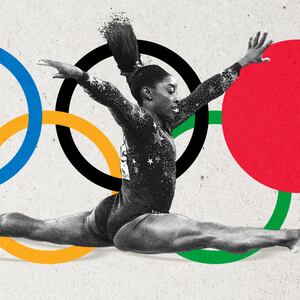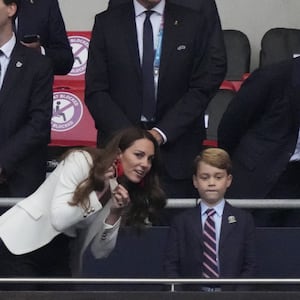It’s 2021 and organizations are still willingly posting racist slanty-eyed pictures on the internet. This time, it’s the Juventus Football Club women’s team.
The club, based in Turin, Italy, and who’s men’s side boasts world-famous Portuguese striker Cristiano Ronaldo, received swift condemnation after posting a tweet featuring a photo of player Cecilia Salvai wearing a cone on her head like a hat and pulling the corner of her eyes in a mocking gesture that is oft-used against Asian people. The caption similarly showed three emojis that echoed the derogatory gesture without any context whatsoever. The outrageous tweet disappeared in less than an hour.
With a brewing social media storm on their hands, the Juventus Women account offered a short “apology” that stated the racist tweet “was not meant to cause controversy or have any racial undertones”—an astounding excuse considering there can be no “undertones” found in something that is outwardly, explicitly racist. It’s literally a globally offensive gesture. (Juventus and the Italian Football Federation did not respond when reached for comment, but the club claims to take “full responsibility” for the “unforgivable mistake” in an online statement.)
And it’s not even the first time the gesture has caused outrage in Italy this year. In April, two hosts for Italian satirical news program “Striscia la Notizia” were skewered online after mocking Asian accents and “slanty eyes” in a sketch about Radiotelevisione Italiana (RAI), the national public broadcasting company that has offices in Beijing.

Cecilia Salvai.
Gabriele Maltinti/GettyBut within the football world, Italy stands out for its racial ignorance. The country that lovingly touts its boot-shaped landmass as symbolic of its love of the game has, time and time again, failed to adequately address its reputation in football for something increasingly condemned by other leagues: racism.
Italian football has long exhibited a penchant for absolutely bungling things when it comes to racist behavior by players and fans. It’s a shame really, especially when the 23-man, all-white national team, affectionately known to its countrymen as the Azzurri, just won the 2020 UEFA European Football Championship. That triumph came after a stunning penalty shoot-out against England, in which the story ultimately became the horrific racial abuse hurled at the three young Black English players whose penalties didn’t make it into the back of the net.
Even then, the Italians had stoked controversy by deciding as a team not to take a knee against racism. The Italian Football Federation said players would do so for matches in which the opposition was kneeling “in solidarity with the opponents” but “not for the campaign itself, which we don’t share.” Though it was common among national European football teams not to kneel, it felt like a missed opportunity for a country plagued by an inability to combat racism in the sport.
One only need to look at their disastrous anti-racism campaign in 2019 in which the Italian Serie A football league commissioned a number of portraits to be installed in their building in Milan by Italian artist Simone Fugazzotto. The artworks attempted to subvert the degrading act of calling Black people “monkeys” by saying that, actually, “everyone is an ape”—Fugazzotto’s words—and then projecting racialized humanoid features onto them, resulting in a “western monkey with blue and white eyes, the Asian monkey with almond-shaped eyes and the Black monkey positioned in the center.” Yes, they really did this. Now clap, you monkeys!
Unlike other European nations that have embraced their diverse homegrown talent (see England’s Bukayo Saka, France’s Kylian Mbappe, Germany’s Serge Gnabry or Belgium’s Jeremy Doku), there is a complete lack of Black players in the Italian national team. Yet there is an unspoken tolerance for white players who have exhibited implicitly pro-fascist behavior, from Mussolini-admirer Paolo di Canio to celebrated goalkeeper Gianluigi Buffon requesting the “88” jersey (a known neo-Nazi symbol), though he denied knowledge of the affiliation. But for those who identify as Afro-Italian and who have made it to the highest level of national Italian football, facing disgusting racial abuse is part of the job.
When Italian forward and then-19-year-old Moise Kean, who played for—surprise!—Juventus, was met with monkey chants from Cagliari fans after scoring a goal and playfully taunting the crowd, his own teammate Leonardo Bonucci said he was equally to blame… for the racism he was subjected to. Decorated Italian striker Mario Balotelli also described “extreme” racism while playing at his peak in Italy. In a seemingly reluctant 2019 return to an Italian club, he said: “I hope with all my heart there won’t be any repeat of the things that happened when I was last here...I hope Italy has taken some steps forward.” But, just months later, he threatened to walk off the pitch and was given a yellow card in the same game for kicking the ball into the crowd after enduring monkey chants during his entire playing time.
It’s the fans who are absolutely unrelenting when confronted with their repulsive behavior, going so far as to side with opposing supporters against their own players in defending racism. Perhaps the most egregious example came in a 2019 fan letter to 2021 Serie A MVP and Inter Milan star Romelu Lukaku, a Black player from Belgium, that sought to convince him that anti-Black racist monkey chants in Italy aren’t actually anti-Black or racist. Italian Inter Milan fans “apologized” to Lukaku for simply imagining the racism that he experienced, writing: “You have to understand that Italy is not like many other north European countries where racism is a REAL problem… We understand that it could have seemed racist to you but it is not like that.”
It gets worse. The fans went on to say that “we have always used that ‘way’ with other teams’ players in the past and we probably will in the future. We are not racist and so are not the Cagliari fans.”
So please enlighten us on what “REAL” racism must be? The non-apology apology by Inter Milan fans then, and by the Juventus team now, lays bare the contradiction that racist behavior is used to dehumanize players of the opposing team (because of the pain inherent in the gesture) but is somehow not racist or offensive. And this behavior goes beyond the fans to the highest levels of the sport. Commentator Luciano Passirani, in apparent praise of Lukaku, said the footballer should be distracted with “10 bananas,” while the former Italian Football Federation president, Carlo Tavecchio was once issued a ban for a comment disparaging foreign footballers who “before ate bananas,” deeming them unqualified to play in Italy.
It’s impossible to stress just how extraordinarily easy it is not to post a racial slur or racist gesture. It’s frustratingly, exasperatingly easy to not compare human beings to monkeys, or make references to bananas. So spare us the racesplaining letters, bullshit apologies, and the offensive lack of consequences. It’s time we see the fight against racism match the fight on the pitch.







